Jack Marso
Riya Patel
AP Latin 🏛
24 resourcesLines 40-56
Lines 50-56
- In lines 1-3, (sic...contorsit), the creature’s stomach is described as...
- In line 3, stetit illa tremens is translated as...
- A stylistic device that occurs in line 4 (insonuere...cavernae) is...
- A stylistic device that occurs in line 5 (et...fuisset) is...
- Translate in context the words arx AND alta AND identify the case of each.
Lines 40-44
Then, foremost Laocoön runs down hastily from the heights of the citadel, to face them all, a great crowd with him, And as he shouts from afar: ‘O unhappy citizens, what great madness is this? Do you think the enemies have sailed away? Or do you think any of the Greek gifts are free of treachery? Is that Odysseus’s reputation?
Breakdown of Lines 40-56 🔎
- The Trojans wonder what the purpose of the wooden horse on the beach is. However, Laocoon begins his rush towards the beach to express his feelings about it. Even before Laocoon reaches the beach from descent from the city, he is still avidly shouting.
- Laocoon rapidly begins to fire off questions towards the Trojan people. “What is this great insanity” Laocoon first asks as he initially wonders what these “wretched” citizens are largely gathering for in what seems to be already known by Laocoon.
- Laocoon shifts his attention to whether the Trojans think that the Greeks “have been carried away” or this gift from the Greeks is “free from treachery”. Laocoon brings up if the Greeks are following the reputation of Odysseus since he was widely known for being a cunning trickster in the Ancient World.
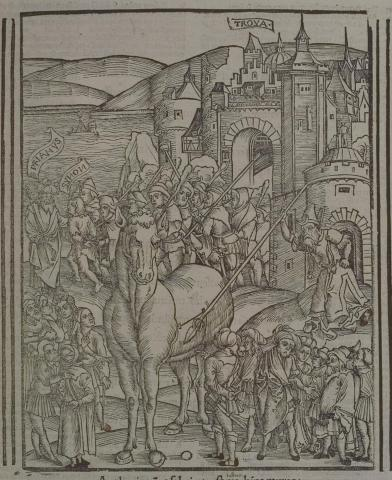
The Trojans are uncertain about what to do with the wooden horse. Laocoon, right of the horse, hurls his spear at the horse while Sinon plants the false story about the horse within the Trojans. Image Courtesy of University of Heidelberg
- Next, Laocoon begins to brainstorm some hypothetical reasons why there is a horse. Laocoon initially guesses the reason why there is a Trojan horse as the Greeks are hiding “hidden in this timber”, but continues to speculate further in the horse being a military weapon against the Trojans.
- Other reasons that Laocoon postulates is that it “looks down upon our home, “it will fall on the city from above” or another trick, but clearly emphasizes at the end that the Trojans should not trust this horse. Laocoon fears the Greeks and doesn’t trust their nature even if gift-bearing is included, although it was a gift to Minerva.
- Laocoon shifts his verbal assault of the Trojan horse to means of action. Laocoon “hurled a great spear” into the “beast” which refers to the Trojan horse. Vergil reiterates how much hatred Laocoon has towards this gift and the Greeks in general. The spear was thrown with “great force” so Vergil highlights it being “stuck” and “quivering” as it was thrown in the curved belly as the hollow spaces “rang” and the cavities to “groan.”
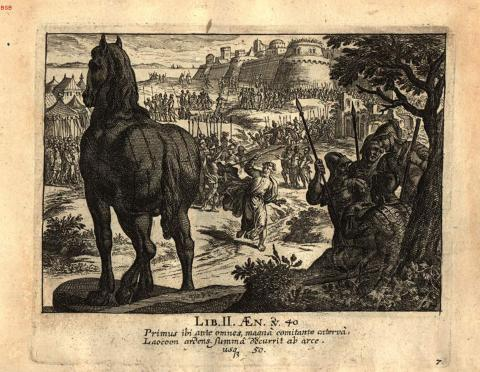
Surrounded by a crowd of Trojan soldiers, Laocoon hurls a spear at the wooden horse. Image Courtesy of the Munich Digitization Center
- Aeneas pities himself that if the fate of the gods or if Trojans hadn’t been foolish, Troy would still stand, as the Trojan horse would be destroyed, exposing the Greek soldiers, and ruining their failed attempt to besiege the city.
Lines 201-249
Lines 220-227
- In line 2 (perfusus...veneno), name one AND only one description that Vergil gives about Laocoon’s headband?
- Translate in context the words clamores AND horrendos AND identify the case of each.
- A stylistic device that occurs in line 5 (taurus...securim) is...
- Translate in context the words saevae AND Tritonidis AND identify the case of each.
- A stylistic device that occurs in line 8 (sub...teguntur) is...
- Drenched in dark blood or drenched in dark venom
- Horrendous shouts; accusative plural: Clamores meaning shouts and horrendos meaning horrendous both come from the accusative. Clamores comes from the third-declension masculine noun clamor, clamoris in the nominative and genitive. On the other hand, horrendous comes from the first/second declension adjective horrendus, horrendi in the nominative and genitive
- Alliteration: Alliteration is the repetition of the same letter or sounds together closely amongst words. In line 5, this is completed by single alliteration in between words throughout the sentence repeating a similar “C” sound: Taurus et incertam excussit cervice securum.
- Of savage Pallas; genitive singular: Saevae meaning savage and Tritonidis meaning Pallas, the daughter of Triton, both come from the genitive. Therefore, of is added because genitives are translated of the ____. Saevae comes from the first/second declension adjective saevus, saevi in the nominative and genitive. On the other hand, Tritonidis comes from the third-declension feminine noun Tritonis, Tritonidis in the nominative and genitive.
- Polysyndeton: Polysyndeton is the literary technique opposite of asyndeton where conjugations are now used repeatedly and successively without commas. The conjugation being used is sub in the ablative meaning under. Simply, the phrase translates as they are hidden under the feet of the goddess and under the circle of her shield.
Lines 235-240
Everyone girds for the tasks and they arrange the wheels allowing motion under its foundation, and extend hemp ropes around its neck. That motor of fate ascends our walls pregnant with weapons. All over boys, and virgin girls, sing sacred songs, and rejoice to touch the ropes with their hands: Up it sails and passes threateningly into the midst of the city.
Breakdown of Lines 201-249 🔎
- As Sinon concludes his speech, convincing the Trojans to bring the horse within the city, Vergil highlights the unexpected fate of Laocoon. First, we learn that Laocoon was a “priest for Neptune, chosen by a lot” and because of that, was sacrificing a “huge bull” in order to find more information about the horse from the gods.
- Suddenly, two serpents, presumably representing Greek kings and twin brothers, Menelaus and Agamemnon, from the island of Tenedos, what would later be where the Greek fleet is hiding before the Trojan horse enters Troy, come into the scene. Their “huge coils” head to the shore from the deep sea as even Vergil “shudders” as he attempts to narrate the incident. The serpent's chests were “raised between the waves”, their “bloody crests” top them, and the rest of their body “glides in the sea” as their back “twists its back large with a coil.”
- As the snakes began reaching dry ground, a sound arose. The serpents “glaring eyes filled with blood and fire” as the snakes “were licking with quivering tongues in their hissing mouth” exposing their veracity and hatred that Pallas had when sending them towards Laocoon.
- Vergil enlists some narrative commentary from Aeneas as the Trojans grow pale from the sight and flee. The serpent's head straight towards Laocoon, as an army would, and we find out that Laocoon’s two sons are with him as well at the altar. Vergil surprisingly kept that part out of the story until now, and in a short time “entangles the bodies of his two sons” while they bite into their “wretched limbs.”
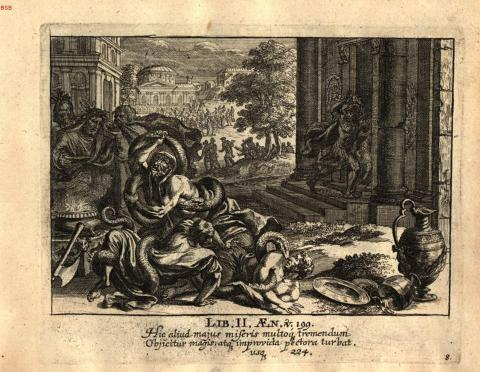
Laocoon with his sons becomes intertwined among the twin serpents. Image Courtesy of the Munich Digitization Center
- Afterward, Laocoon comes to their aid “with spears in his hands”, he becomes seized too. Laocoon becomes bound with massive coils, they encompass his back and waist twice with their “scaly backs.” In a matter of time, Laocoon is conquered by them. In desperation, Laocoon attempts to tear apart the coils with his hands as his “headbands soaked in blood and black venom.”
- At the same time, Laocoon begins crying for help from the gods and the shouts are compared by Vergil to a wounded bull bellowing as he flees from the altar wounded with an “ill-aimed ax” from its neck. However, the “dragon’s pair” referring to the serpents, flee from the brutal scene to the highest citadel of fierce Pallas, where they become hidden by “the feet of the goddess and under the circle of her shield.”
- The Trojans aren’t aware that the serpents were sent by Minerva, but rather believe that Laocoon has paid for his crimes of striking the “sacred oak with his spear” meaning the Trojan horse. Therefore, the Trojans shout that the horse must be let into the city and the goddess’s divinity must be prayed for.
- The walls of the city are divided and opened. In means of pleasing the gods, everyone works to open up the city as they “place rollings of wheels under the feet” and “stretch hemp ropes around the neck.” The Trojan horse is doing exactly as Laocoon feared as it is “pregnant with arms.” Boys and unwedded girls sing sacred songs while they pleasingly touch the ropes as it passes by, but the horse still “sails and passes threateningly into the middle of the city.”
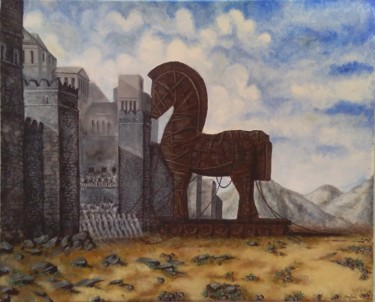
The wooden horse is entering the city of Troy. Image Courtesy of Artmajeur
- As the horse entered the city, Aeneas discusses Troy before it was burned and surfaces the pity we feel for the fallen city later on. Even though the Trojan horse was “stopped at the threshold of the gate” and “the arms produced a sound in its belly” four times for each, the Trojans were “blind with rage” and allowed the Trojan horse to sit near the most dedicated citadel where the serpents lie.
- Lastly, Cassandra, the daughter of Priam, who has the power of prophecy from Apollo, but nobody would ever believe her since she denied his sexual advances, would even speak in this dire moment to cover the temples of the gods with festive branches in what would be Troy’s last day.
Lines 268-297
Lines 274-279
ei mihi, qualis erat, quantum mutatus ab illo Hectore qui redit exuvias indutus Achilli vel Danaum Phrygios iaculatus puppibus ignes! squalentem barbam et concretos sanguine crines vulneraque illa gerens, quae circum plurima muros accepit patrios
- Write out all of line 1 (ei...illo) and mark scansion.
- Based on knowledge of Greek and Latin texts, what Greek epic has Hector made an appearance before?
- Based on knowledge of Greek and Latin texts, what side of the Trojan War was Hector on? How about Achilles?
- Write out all of line 4 (squalentem...crines) and mark scansion.
- Write out all of line 5 (vulneraque...muros) and mark scansion.
- From left to right: dactyl-dactyl-spondee-spondee-dactyl-spondee
- Homer’s Iliad
- Hector: Trojans; Achilles: Greeks: Hector was a Trojan prince and famously recognized as Troy’s greatest fighter during the Trojan war, subject to “killing 31,000 Greek fighters” by some reports. In Homer’s Iliad, Hector faced off prominently with Protesilaus and Ajax but ultimately fell to his untimely death to Achilles in a duel. Vergil’s Aeneid faintly recalls Hector’s spirit warning Aeneas to flee Troy. However, Achilles was an honorable hero of the Trojan war and proclaimed the greatest Greek warrior of all time because of his actions. However, Achilles was killed by Trojan prince, Paris, under the assistance of Apollo, as he shot with a poisoned arrow in his heel, the only place he was vulnerable. The “Achilles Heel” has since come to mean weakness in a specific area that is overall strong while the Achilles tendon is also named after him based on these legends.
- From left to right: spondee-spondee-spondee-spondee-dactyl-spondee
- From left to right: dactyl-dactyl-spondee-spondee-dactyl-spondee
Lines 287-292
He (Hector) does not answer, nor does he delay on my idle questions, but heaving deep sighs from the bottoms of his heart, he says: “Ah! Son of the goddess, soar, remove yourself from these flames. The enemy has overcome the walls: Troy cascades from her lofty location. Enough has been granted to Priam and your country: if Pergama could be rescued by any right hand, it would have been rescued from this.
Breakdown of Lines 268-297 🔎
- As Troy’s last day concludes and night falls, the Greek soldiers exit the Trojan horse and begin their rampage by means of killing a few Trojan guards and opening the gate for the rest of the Greek soldiers. Aeneas is commenting that the first part of the night is enjoyable and welcoming for “weary men”, but allows the Greeks to enter unnoticed and lead to the destruction of Troy.
- Aeneas is still sleeping, but in his dreams, Hector’s spirit, the lone savior of Troy, since he had just been killed by Achilles, appears to him gloomful. A two-horse chariot tore Hector’s body after being slain as Hector is seen covered with “dark with bloody dust” and “his swollen feet pierced with leather straps.”
- Aeneas can’t believe how much Hector’s appearance has changed with two allusions from the Iliad. One reference from Iliad Book 17 includes Hector killing Patroclus and Hector stripping and then donning the armor of Achilles that Patroclus has previously worn, the other from Iliad Book 15 when Hector led the Trojans down to Phrygians and threatened to burn their fleet.
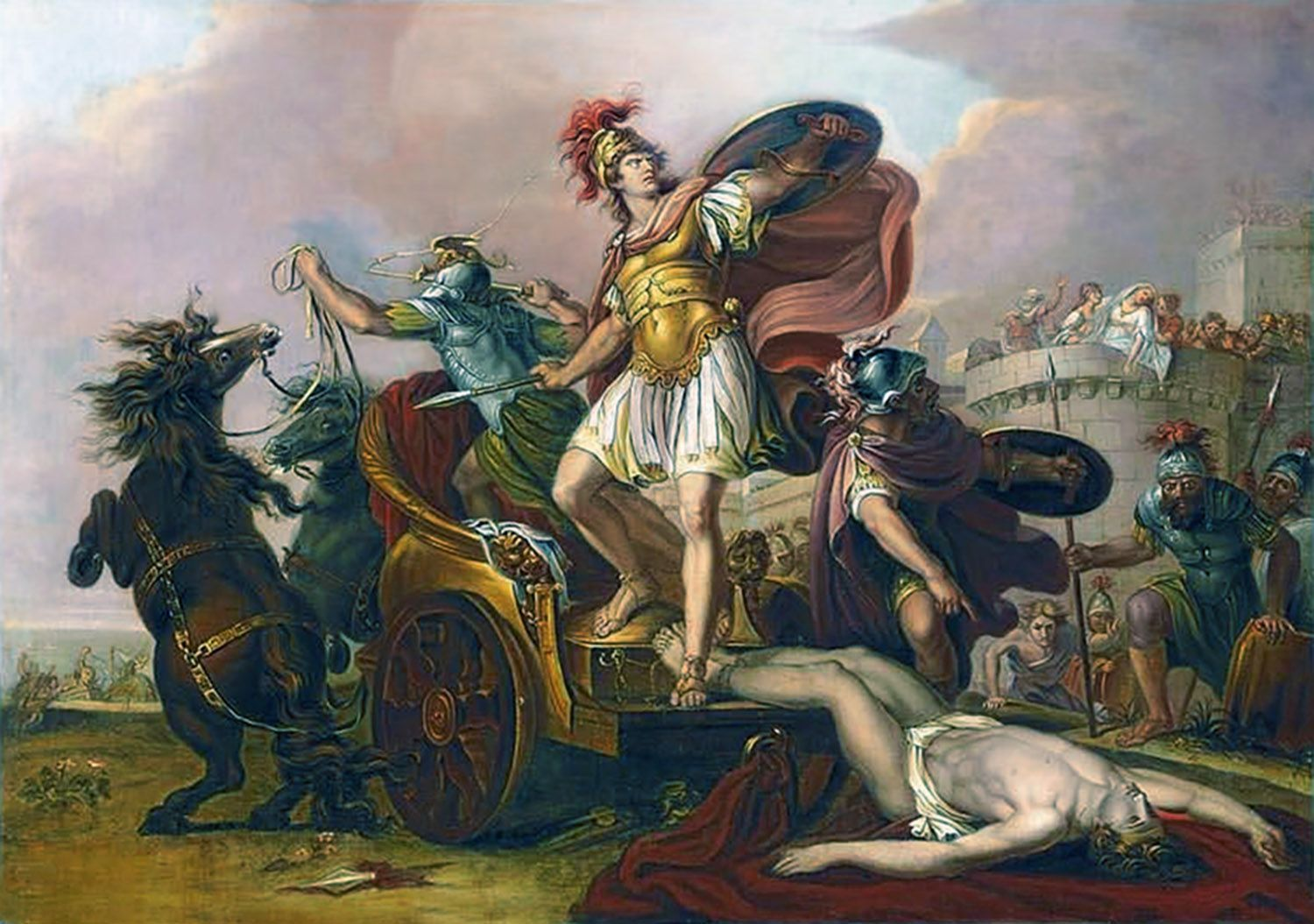
Achilles, after killing Hector, dragging his body with his two-horsed chariot. Image Courtesy of Pinterest
- Hector was once a man “carrying a disgusting beard” with his “hair matted with blood” and “with many wounds” in between King Priam’s, his father, walls. Aeneas, weeping, seems as if he is going to speak first before Hector makes his appearance vocally, but isn't sure yet because he is still in a dream.
- Aeneas is confused by seeing “the light of Troy, surest hope of the Trojans”. Aeneas doesn’t know that Hector has already died, but is just absent. Aeneas believes that Hector is just weary “after the many deaths of his people” or from the “varied labors of our people and our city.” Aeneas concludes by wondering what caused Hector to be there emotionless as he spots the distinct features of Hector’s wounds but still isn’t able to put the pieces of the puzzle together.
- Hector doesn’t reply or even think about his foolish questions, but instead “heaving deep sighs from the bottoms of his heart” begins to straight-forwardly speak. Aeneas is reminded by Hector of his nature with the gods as his mother is the goddess, Venus, which leads into Aeneas beginning to lean on her in times of dire or uncertain moments throughout the Aeneid.
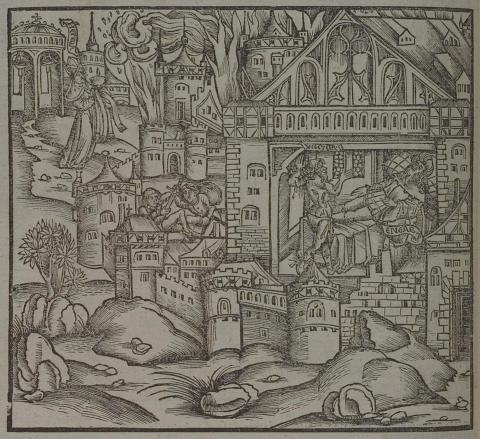
The ghost of Hector appears to Aeneas lying on the bed and informs him to flee the city amid the Greeks ravaging Troy. Image Courtesy of University of Heidelberg
- Aeneas is brought into the loop of what is transpiring within the city of Troy and he is sleeping as Hector immediately stresses for him to flee the city. “The enemy has overcome the walls: Troy cascades from her lofty spot”, as there’s no more time for saving the city, but rather the Trojan citizens and himself instead. Hector explains that “if Pergama could be rescued by any right hand, it would have been rescued from this.” meaning that Hector kept the city safe during his life, but not even Aeneas could save the city this time.
- Hector finishes his speech by entrusting “its sacred rites and its deities to you” where Aeneas will carry the Trojan religion to Italy where these “friends of your fate” will be ingrained in the city of lofty walls of Rome. By visual, Hector shows Aeneas the rites from the Temple of Vesta in Troy: the headbands, the Vesta (the goddess of the hearth), and the sacred flame of which will be an important part of the success and prosperity of future Rome.
Lines 559-620
Lines 567-574
- Based on knowledge of Greek and Latin texts, which TWO Greek epics have Helen largely made an appearance before?
- Based on knowledge of Roman culture, what is the term of the six prominent priestesses that watched over the Temple of Vesta?
- What was Helen’s role in the Trojan War?
- Translate in context line 3-4 (dant...ferenti).
- How does Vergil’s perception of Helen in the Aeneid differ from that of Homer’s Iliad during the Sack of Troy?
- Homer’s Iliad and Odyssey
- Vestal Virgins: The Vestal Virgins or the Vestals were recognized for the success and protection of Rome in means of not allowing the sacred fire in the Temple of Vesta to go out. The Vestal Virgins would take a thirty-year pledge of chastity in order to devote themselves to the correct and observed rituals while also ignoring social obligations of marrying and bearing children as well. The celebration of Vestalia between June 7th and June 15th was the major festival for Vesta, the goddess of health.
- Helen is largely associated with helping precipitate the start of the Trojan War: Helen of Troy was the daughter of Jupiter, the king of all gods, and is famously known to be the most beautiful person in the world. From Vergil’s Aeneid, Helen was abducted by Theseus where competition for her hand in marriage grew. Menelaus’s gifts were more heavily favored amongst the rest of her suitors and were married. In respect, all of the former suitors agreed on the Oath of Tyndareus, which stated that the other suitors would provide a military defense to the husband if Helen was ever stolen. In Homer’s Iliad at the Judgement of Paris, Jupiter asks Paris to judge the most beautiful goddesses; Juno, Minerva, or Venus. Venus offered Helen to Paris in return for his favor, ultimately Paris would choose Venus. Helen was carried off to Troy and seduced by Paris. The Greeks would start the Trojan War in return since they set out to reclaim her from Troy, and therefore, fulfilling the oath.
- ...The shining flames awarded to me wandering and enduring my eyes all about through everything: Let’s break this down step-by step. Clara, meaning shining, and incendia, meaning flames, are both nominative neuter plural and will start off the sentence, translating as The shining flames. Dant is a third-person plural present active indicative of do, dare, meaning I award. Therefore, Dant translates to awarded. Lucem is the accusative singular of lux meaning light. Erranti is in the dative which comes from the third-declension participle errans, meaning wandering. Simply, it translates to me wandering. Ferenti follows a similar path as erranti in means of both being dative and coming from a third-declension participle. Ferenti is derived from fero meaning I endure, so ferenti translates to to me bearing, but since erranti was dative too, it looks just like a participle. Oculos is the accusative plural of oculus meaning eye. In brief, oculos translates exactly like the nominative. Per cuncta is in the accusative since per, meaning through is not a proposition that takes the ablative case. Cuncta is an accusative neuter plural of cunctus meaning all about. Let’s jump to the next word first before we put that all together. Passimque is passim with a que added, with the que translating as and. Passim is an adverb that means everything. So, the final section translates as all about through everything.
- Vergil’s Aeneid describes Helen’s story from a treacherous stance where Helen stimulated Bacchic rituals with a group of Trojan women once the Trojan horse entered the city where she would signal the Greeks from the thresholds of Vesta. Homer’s Iliad describes Helen’s story as playing with the hearts of the Greek soldiers within the Trojan horse as she imitated the voice of the soldier’s lovers. Helen is lonely and of the need of sanctuary while Troy begins to burn. The Greeks and Trojans were then prepared to stone her to death, but her beauty caused Menelaus, her husband who said that he was the person designed to kill her unfaithful wife, to drop his sword and not kill her.
Lines 615-620
Now, look, Tritonian Pallas, sits on the loftiest towers, glaring from the storm-cloud, and fierce with her Gorgon breastplate. Father Jupiter himself supplies the Greeks with spirits, and favorable strengths, himself arouses the gods against the Trojan army. Hasten your departure, son, and put a halt to your efforts. I will not leave you, and I will set you safe at your father’s door.
Breakdown of Lines 559-620 🔎
- As Pyrrhus leads the Greek assault on Priam’s palace, Vergil focuses the attention back onto Aeneas on top of Priam’s palace as he scans over all of the destruction that transpired over Troy.
- After everything that Aeneas does in order to defend the city of Troy and after experiencing the death of Priam, he finally has time for emotion to take over. “Fierce terror gripped me” as Aeneas is horrified by the Trojan defeat. Aeneas was aghast as he now remembered the “image of my dear father...with a cruel wound breathing his life away.”
- Aeneas continues to think about three further things: his wife “abandoned”, his home “plundered”, and the fate of his little son Iulus, later to be known as Ascanius, the legendary king of Alba Longa once formed. Aeneas now switches his approach to the “troops that were around me.” All of the tired soldiers have deserted Aeneas and have either fallen to their death or were burned up.
- The next section is the Helen Episode, which has historians argue the validity of these lines as it was edited within the reign of Augustus in order to remove “superfluous bits.” However, we still read on! Aeneas is now sacredly alone as he spots Helen, the most beautiful person in the world, and the precipitate of the Trojan War beginning, at the Temple of Vesta, the goddess of the hearth and fertility, is seeking sanctuary. The “fires give me light” as the undying holy fire permits Aeneas to “wandering and enduring my eyes all about through everything.”
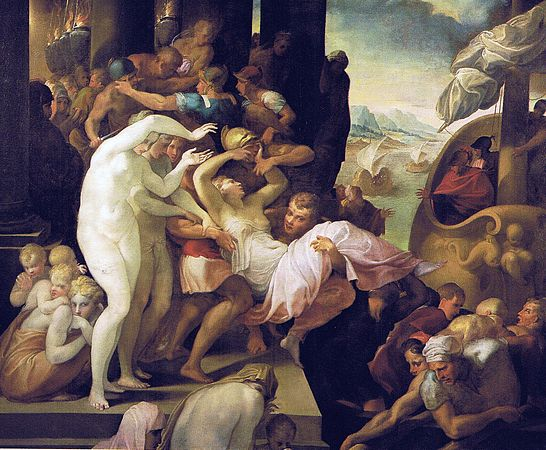
Helen's abduction by Paris begins her journey to Troy. Image Courtesy of Francesco Primaticcio
- Helen is afraid of the Trojans’ hostility after the overthrow of Pergamum while she also fears “the punishment from the Greeks” since her departure caused the Trojan war and “the angers of her abandoned husband, which we know is Menelaus. Nobody is favorable of Helen anymore as she is a shared “fury” between Troy and the Greeks, as “the hated thing” hides herself sitting at the altars.
- Fire begins to burn in Aenea’s soul, he feels the rage to avenge Troy and the wicked punishments he wishes to exact. Simply, Aeneas burns to kill her. Aeneas’s internal monologue begins as Aeneas wonders if Helen will see Sparta and her “native Mycenae” again unharmed as she is now the hated thing between both sides of the war. Helen will “go as queen” after this military victory and be able to see “her house and husband, her parents and children” with a crowd of Trojan women and Phrygian servants. Will Priam have died, will Troy be burned by fire, and will the Dardan shore be soaked again and again with blood for no reason with Aeneas doing nothing about it?
- These events wouldn’t have happened without consequence for Helen. For Aeneas, there’s no great glory in Helen’s punishment, nor will this killing earn much merit. However, Helen is a crime or a sin and dehumanizes that “quenching wickedness” would be a “deserving punishment.”
- Aeneas finishes by stating that it will be pleasing to “fill my soul with the flame of revenge” and “avenge the ashes of my people.” Filled with an enraged mind and uttering such words that he had just been saying, his “dear mother”, Venus, came to him “never before so clear to his eyes.”
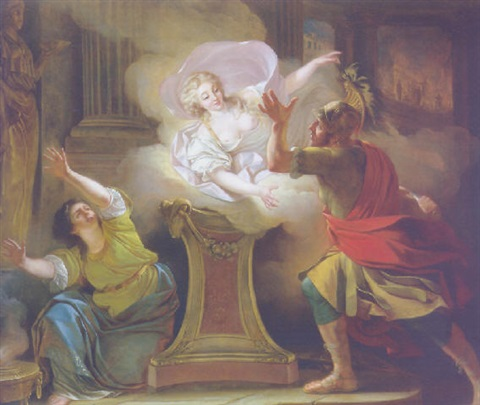
Aeneas pursuing Helen in the Temple of Vesta. Image Courtesy of Artnet
- The revelation shows how carried away Aeneas is as he still stands on the roof of Priam’s palace. Venus radiated with pure light in the night (see what I did there) revealing herself fully as a goddess in the way that other gods/goddess would perceive her as, and not how she was disguised in Book 1.
- Aeneas was halted and restrained by Venus, grabbing his “right hand as she began to speak from her “red mouth.” Venus addresses Aeneas wondering “what great grief” aroused these “uncontrolled angers.” Venus asks why Aeneas is raging, and where the “care for us”, meaning his family, vanished. Venus reminds Aeneas of his family, which he already began thinking about after the death of Priam, but this time asks why Aeneas hasn't been looking for them instead.
- Venus concludes by addressing the consequences that could happen to them. The Greek forces “surround them all” and if “my concern [for them] stops”, as Aeneas’s lack of concern for his family previously, they would have already been engulfed by flames or drained by the sword. Aeneas must now come to their rescue. In an attempt to drive Aeneas’s mind off of Helen, Venus asserts that neither Helen nor Paris, the Greek prince who abducted Helen, is not to blame for the knocking “Troy from its peak” but instead the “ruthlessness of the gods” is the sole instigator.
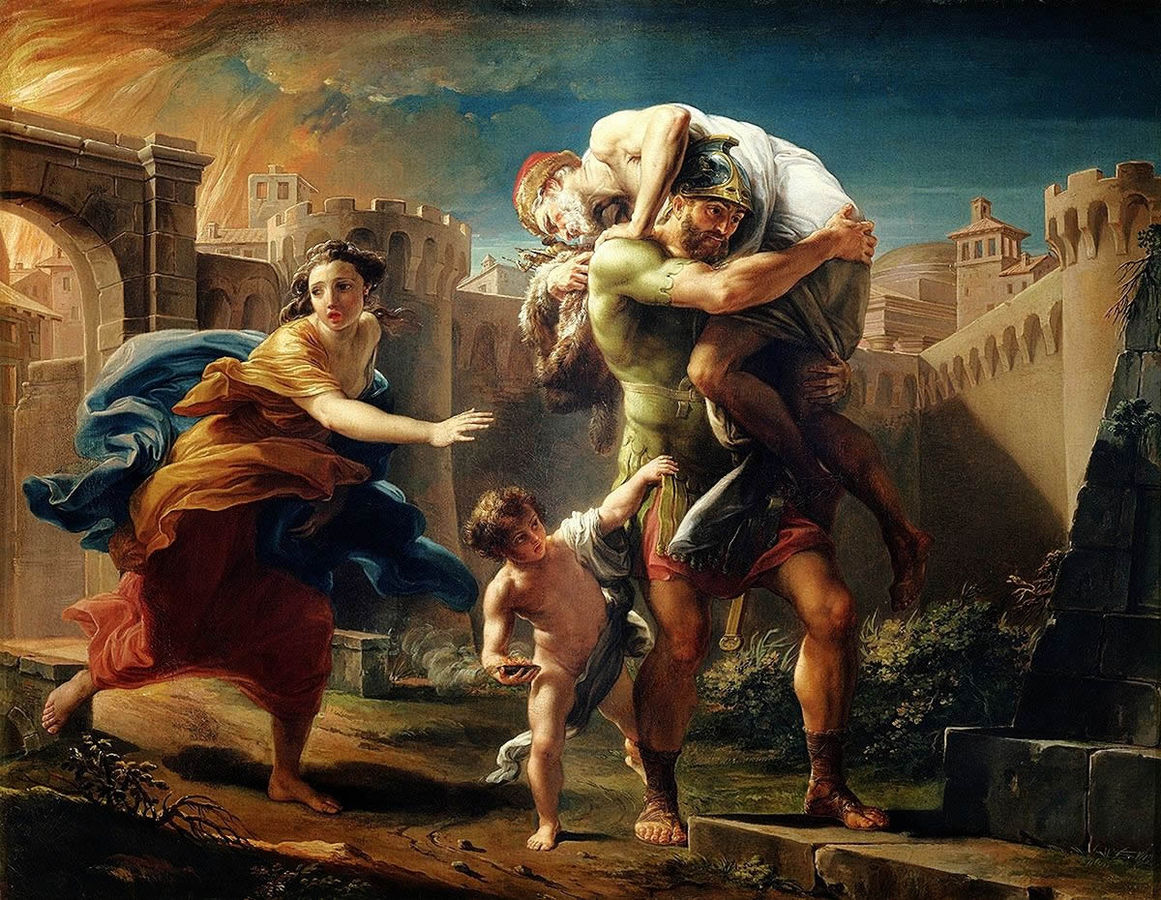
Aeneas and his family fleeing Troy. Image Courtesy of Pompeo Batoni
- Venus understands that Aeneas might not believe her at first, so she needs to explain in evidence why the gods should be blamed. Venus will remove “the whole drawn-over cloud” that “dims your mortal vision” in order to remove the barriers between the mortals and the gods so that they can see everything that’s happening clearly. Venus says that Aeneas should not fear “what your mother commands” nor to “refuse to obey her instructions.” Venus now shows Aeneas the “shattered structures” and the rocks of the wall tumbling into the city as the smoke bellows with “dust mixed in.”
- The most important part of her evidence is the fact that the gods are within the action of destroying the city as well. “Neptune is jostling the walls and the foundations shifted by his powerful trident” as the whole city is torn from its roots. Neptune opposes the Trojans, although he helped build these great walls, with the assistance of Apollo, since the father of King Priam, Laomedon, didn’t pay. Venus motions his Aeneas’s view to another goddess, Juno, to the Scaean gates, or Troy’s most famous gates near the Greek camp. Juno is the leader of the destruction against Troy where she calls upon the troops from the ships, in rage.
- Lastly, Pallas Minerva is “glaring from the storm-cloud” from the “loftiest towers” with her “Gorgon breastplate”, the head of Medusa, as her appearance becomes hidden. However, Jupiter’s role is emphasized and reinforced by “supplying the Greeks with spirits, and favorable strengths” and “arousing the gods against the Trojan army.” It was the divine plan that Troy fell, as we already know the reasons why the other god/goddesses are fighting, Jupiter makes sure he follows the fates.
- Lastly, Venus commands Aeneas to leave, drop his labor of going after Helen, and reminds him that although the other gods/goddesses are against him, Venus will always be watching after him.
The Ending

Image Courtesy of Giphy

Fiveable
Resources
© 2025 Fiveable Inc. All rights reserved.